by Christie Purifoy | Mar 17, 2015 | children, Faith, grief, Lent, Scripture, Uncategorized, Winter
“you will be called Repairer of Broken Walls”
Isaiah 58:12
*
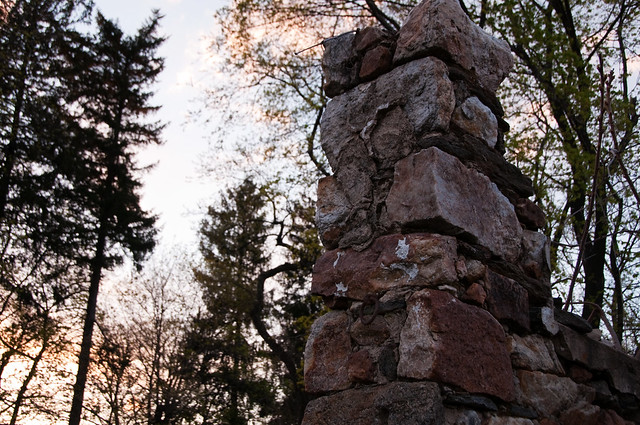
*
We have arrived at those muddy, brown days between winter and spring. When I cross the yard to the chicken coop, it feels as if I am walking on a sponge. We have had a few warmer days and a few sunnier days, but it is not yet clear to me if the damage of this winter can be undone.
Somehow I find it harder to believe in spring the closer it comes.
*
My daughter is learning about the Holocaust in school. Every afternoon she shows me some newly acquired fact, as if she half believes that this time, this time, I will contradict her teacher. I will say, No, no, it wasn’t as bad as that. Instead, I only ever say yes. Yes, it’s true.
Here is what she does not say: How do you go on living in a world where such things have happened? Still happen?
Here is what I do not say: I don’t know.
*
As a writer, I pick up the pieces. Even the ugly, broken pieces. I arrange them and rearrange them, and I search for hidden meaning. I find patterns, and they always say the same thing. They say, Look! Here is something beautiful. Here is good news.
Except that recently, I can’t seem to find the pattern. The broken pieces remain only broken pieces.
They are so many. They are so sharp.
*
Because it is Lent, we begin each Sunday service with The Decalogue rather than a hymn. We hear the list of God’s ten commands, and they are like stones that form a wall that enclose a garden.
Gardens grow best within the shelter of a wall, but we have torn down the wall with our own hands.
*
Perhaps we must first listen to the bad news if we hope ever to hear the good.
Perhaps it is sorrow for all the broken pieces and all the tumbled stones that gives us courage to stand up. To rise up, leave the sackcloth and ashes, and go searching for our new name.
*
by Christie Purifoy | Feb 14, 2015 | Books, children, Gardening, Home, Seasons, Uncategorized, Winter
It’s the coldest weekend of the season for us here at Maplehurst.
The week did not begin well. The same night Jonathan left town for a business trip, the tank of heating oil that supplies our furnace ran dry.
Oops.
Elsa and I spent the next morning wearing coats by the parlor fireplace waiting for an oil refill and a technician to restart our heating system.
However, the week ended with the installation of our much dreamed-about, much anticipated woodstove. It sits in our once freezing kitchen, but, as I type this from the kitchen table, the room is throbbing with warmth.
If you’re looking for any of us this weekend, you’ll find us here. In the kitchen. Feeding logs into the mouth of a cast-iron stove on four, pretty little legs, reading picture books and gardening books and the woodstove manual.
You’ll find us here, drinking coffee and cocoa, reading about mice who drink “acorn coffee” and deciding the very important question of whether or not acorn coffee might be something we’d like to try.
The following post contains affiliate links. You can find all my book recommendations here.

The acorn coffee appears in Winter Story (Brambly Hedge) by Jill Barklem, but we love every beautiful book in the Brambly Hedge series. You might begin with the four seasonal books (I am very fond of the June wedding of the miller mouse and the dairy-maid mouse that takes place on a bark raft floating at the edge of the stream), but don’t miss the other stories. My boys, especially, love to follow the winding staircase in one of the images from The Secret Staircase (Brambly Hedge)
by Jill Barklem, but we love every beautiful book in the Brambly Hedge series. You might begin with the four seasonal books (I am very fond of the June wedding of the miller mouse and the dairy-maid mouse that takes place on a bark raft floating at the edge of the stream), but don’t miss the other stories. My boys, especially, love to follow the winding staircase in one of the images from The Secret Staircase (Brambly Hedge) .
.
These books are thirty years old, but they were old-fashioned when they appeared. They celebrate English seasonal folk customs as depicted in a community of hedge-dwelling mice. The mice wear straw hats and drink delicate, floral wines. There is a lord and lady and a palace, but they store their food communally in a stump. They enjoy picnics and outings to pick blackberries. Do I need to say more?
I will say more but only this: it is the highly detailed illustrations that make these books so magical. Every intricate twist in a mouse cottage burrow is depicted in delicious detail. A patch of trees lights up with tiny mouse windows. A cottage kitchen drips with stored crabapples, homemade jam, and embroidered tea towels.
I pretty much want to move in to Brambly Hedge.
*
One of the most surprising and inspiring books I’ve read this winter is Keeping House: The Litany of Everyday Life by Margaret Kim Peterson. Recommended by a friend who studied with Peterson at Eastern University, this is a book about the spiritual value of housekeeping. It is for men and women, married and single, university students, empty-nesters … what I’m trying to say is that this book offers something important and encouraging to anyone who has ever found themselves with a dirty dish in their hand or a bed in need of making.
by Margaret Kim Peterson. Recommended by a friend who studied with Peterson at Eastern University, this is a book about the spiritual value of housekeeping. It is for men and women, married and single, university students, empty-nesters … what I’m trying to say is that this book offers something important and encouraging to anyone who has ever found themselves with a dirty dish in their hand or a bed in need of making.
As someone who values the home but loathes just about every task associated with keeping one (I tolerate laundry, I despise cleaning, I rarely make my bed), this book completely reoriented the way I see my home and the work involved in caring for it. I’ve always said that washing dishes can be holy work, but I don’t think I ever really believed it, until I read this.
Keeping House is rich in theology, but it is clearly written, thoroughly accessible, and seasoned with personal stories. I loved it. I can’t recommend it enough.
*
One book I’ll keep close to the woodstove this weekend is Dirr’s Encyclopedia of Trees and Shrubs . This is an enormous, treasure of a book, and it is not inexpensive. Even though I was cashing in a gift card, I still debated quite a bit before I hit purchase.
. This is an enormous, treasure of a book, and it is not inexpensive. Even though I was cashing in a gift card, I still debated quite a bit before I hit purchase.
But, wow! I am so glad I did. This book is the work of a lifetime, particularly of famed botanist Michael Dirr’s lifetime, and you will not find a more exhaustive, thoroughly researched, delightfully written, well-photographed book of trees, shrubs, and vines.
I love the personal, witty writing style (if a tree is rubbish for gardens, Dirr will let us know), I love reading the histories of familiar trees, I love the lists of particularly worthwhile varieties. I’ll be planting three crabapples this spring, and I’ve already chosen the named varieties based on Dirr’s descriptions.
If you aren’t quite ready for the financial commitment (not to mention the commitment of coffee-table space), you might prefer to read Dirr’s earlier volume Dirr’s Hardy Trees and Shrubs: An Illustrated Encyclopedia . This is a smaller book (though not small), and the information is slightly less up-to-date, but it remains an excellent resource. Also, you should be able to find it at your library.
. This is a smaller book (though not small), and the information is slightly less up-to-date, but it remains an excellent resource. Also, you should be able to find it at your library.
*
Today, I have one bonus recommendation. Dawn Camp’s just-released collection The Beauty of Grace: Stories of God’s Love from Today’s Most Popular Writers is lovely. It is brimming over with brief reflections from some of my favorite Christian bloggers. I love that this book gathers some of the best of ephemeral internet writing and gives it permanence.
is lovely. It is brimming over with brief reflections from some of my favorite Christian bloggers. I love that this book gathers some of the best of ephemeral internet writing and gives it permanence.
I think this book would make an especially fine gift. I love giving books as gifts, but sometimes it is difficult to find just the right book match. This book solves that problem entirely. Everyone will find something to love in this book. But my highest praise? It has earned a place by my bedside table.
by Christie Purifoy | Nov 13, 2014 | children, Family, God, grief, Jesus, motherhood, prayer, Seasons, Spring, Winter
I know that the killing freeze arrived later this year because I checked last year’s date in my journal. I understand that the cold air pouring in even as I type is, if anything, overdue, and yet I wish it had held off longer still.
Winter approaches, and I find myself afraid.
Most of the maple leaves have fallen, but the trees still wear a few. They look like dabs of watercolor paint. It is autumn’s last deep breath before the descent of winter’s gray veil.
Last winter was long, and the memory is still heavy. I love snow falling past the window, and I love pulling my children on a sled through the Christmas tree farm, but winter is not only that. Winter is also dark afternoons and ice in the chicken’s water and snow turned to mud.
*
We have all been sick for weeks, and I keep getting better only to get worse again. The baby’s eyes are red and infected, and our whole house shakes with bone-deep coughs.
I am too weary for bad news, I have kept the radio turned off, but terrible tidings slink in, like that draft around my office window. First there was a text from my friend. Such a devastating loss. A week later there was a phone call from family, and that one was so much worse.
They aren’t my stories to tell. Perhaps they aren’t stories at all. They are ruptures. Faultlines.
But you don’t need the details. I’m afraid you’ve heard them before. You, too, have received a text. You, too, have picked up that phone. These are the things that should never happen.
These are the stories every atheist mentions when he or she says they cannot, cannot believe in a good and loving and all-powerful God.
And I find I have no desire to argue with them. Such things should not happen. My atheist friends are absolutely right about that.
*
When the text came in, I started praying a prayer I’ve never prayed before. I think every true prayer is given, but the given-ness of this one was more apparent than most.
I prayed Let there be light.
I was still praying that prayer when the phone call came. And now I see no reason to stop. Lord, let there be some light. Dear God, please.
It is a winter prayer, and it beckons me toward spring promises:
For as the days of a tree, so will be the days of my people …
They will not labor in vain, nor will they bear children doomed to misfortune.
– Isaiah 65:22-23
I want to believe that these words are true, but I am thinking of two mothers. One labored in vain. One bore a child doomed to misfortune. At least, that is what appears to be so.
But what if death was no more the end than winter is the end? What if these words are yet true for these mothers and their children? All hope seems lost, but maybe that is a lie.
After the cross came an empty tomb in a springtime garden.
Winter is near. They say it will be long and cold. I know for certain that it will be dark. But I also know that on the other side of winter is spring.
On the other side of death is life.
*
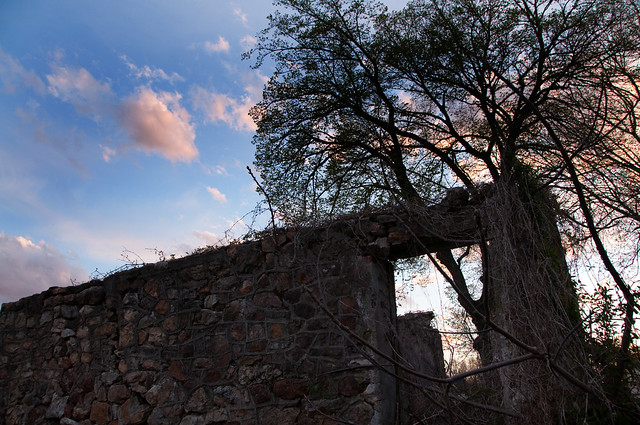
by Christie Purifoy | Oct 30, 2014 | Autumn, children, Community, Jesus, Pennsylvania, Seasons, Uncategorized
My friend looks up toward the trees and says I had forgotten how graceful dying can sometimes be.
I follow her glance and know that she is right. I, too, have forgotten. I remember autumn through snapshots. Which means, I remember the brilliance of that one sugar maple down the road. Or, I remember the startling red of a Burning Bush shrub against a deep blue sky.
The snapshots help me to remember true moments, fiery moments, but they do not give an accurate picture of the whole.
Autumn, taken as a whole, does not look like clear, bright brilliance. Here in my corner of Pennsylvania, it is gentle. Faded. It is burnished gold and copper. It is gray clouds and wet pavement.
This autumn world does not rage against the dying of the light. It smolders, quietly. Gracefully.
*
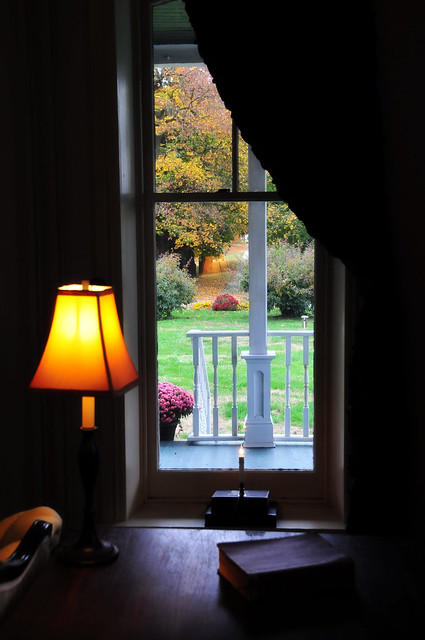
*
This time of year, it seems Christians like to talk about Halloween on the internet. I tend to abstain from those “conversations.” So much depends upon context. Like the context of our own memories. Like the context of our own communities. Often, the internet is a conversation without a context.
Here is a bit of mine.
In the church of my childhood, Halloween was ever-so-slightly taboo. We wore costumes, but we wore them to collect candy at our church’s “Harvest Fair.”
As new parents, we discovered the great adventure of escorting a tempermental two-year-old ladybug down city streets. We stole her candy when she wasn’t watching, and we hugged our neighbors. We tried to catch the eye of their over-tired Dorothy or Scarecrow. To tell each one we had no idea it was them.
Still, decorating my home for Halloween always seemed like a step too far. Until we came here. Now we live in the farmhouse on the hill and how else can we entice our neighbors and their children to climb our hill, to receive our gift of love and candy, but with a few smiling ghosts and candle-lit pumpkins?
Context. It changes things.
Changes us.
*
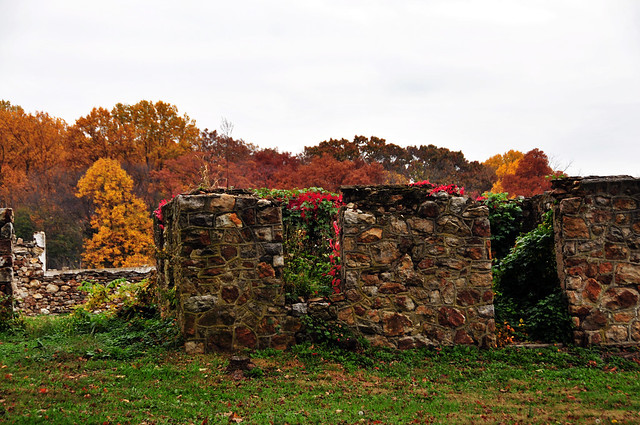
*
We live in a culture that largely ignores death. Our children no longer walk to church through churchyards dotted with graves.
Our own church is that rare thing with its own cemetery, but it is all the way around by the back door. My children often ask to walk that way, but I am in a hurry. Another time, I say, as I rush them through the front door.
I am sorry for this. And so, this year, I am grateful for Halloween. I am grateful for the space it opens up. I am less grateful for the gory zombie poster set at a child’s eye level at the local Wal Mart, but mostly I am grateful for the opportunity to talk about death. About dying. About our baptism and what it might mean that we have already died with Christ.
Which is, to say, we will have a conversation about living.
Soon, we will bring out the plywood grave markers my husband made last year. Our kids painted them gray with black crosses and the letters R I P. We will tuck them near the crumbling stone foundations of the old farm buildings, and we will drape them with twinkly lights.
As we outline a path for candy-seeking neighbors, my daughter will ask me again about those letters R I P. And as darkness settles, and the lights begin to flicker and gain strength, she will tell me It’s beautiful, Mom. So beautiful.
*
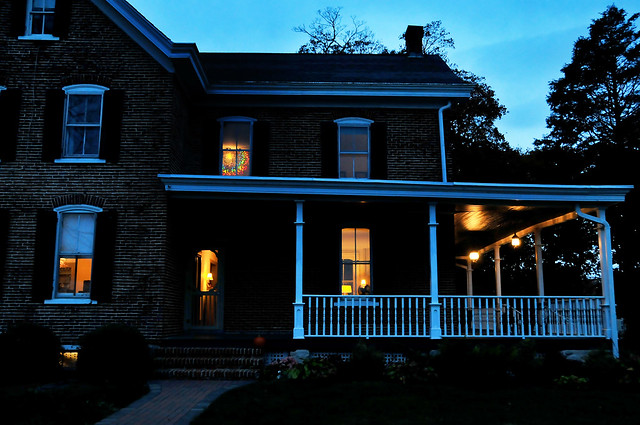
*
by Christie Purifoy | Aug 26, 2014 | Autumn, children, Family, motherhood, Seasons, Summer, Uncategorized
Summer came to an end at approximately five pm on Sunday night.
At five pm on Sunday night, I was sauteeing squash ribbons (that four out of four children would not eat) and flipping cheese quesadillas (that two out of four children would not eat) while hollering at the boys to clean their room and listening to the firstborn debate first-day-of-school outfits.
I was mentally prepping school lunches, signing an emergency-contact form for the oldest, and telling the youngest that now was not a good time for playing in the sink.
The youngest threw herself across the floor while I two-stepped toward the dinner plates.
And there, at utter loose ends in my kitchen, is when I knew summer was over.
***

***
Summer may be chaotic and intense, but in summer there is less pressure to chase down every last loose end.
Did we eat popcorn for dinner instead of vegetables? Well, it’s summer. Tomorrow we shall raid the garden.
Did the five-year-old hop into bed with dirty feet? Well, maybe we’ll wash off with a visit to the creek tomorrow.
In Fall, we remember the calendar and the budget and the email inbox.
In Fall, the overgrown garden looks sad rather than abundant. In Fall, the baby’s hair is plastered to her forehead with applesauce instead of sweet baby sweat.
In Summer, loose ends twine like pea vines on lattice. They tempt us to stay up past our bedtimes. They draw us on to look deeply at sunsets and the freckles on our loved one’s nose.
In Fall, loose ends scatter themselves like beads from a broken necklace. We scramble and cry, but we know we will never find them all. We will never manage to gather the details. We will fail to live up to at least a few of our responsibilities.
***
I long for my own little chore chart. With three neat rows and a gold star for each grid.
But there are no gold stars waiting for me at the end of my email inbox. No gold stars when I have packed three healthy, nut-free, school-approved snacks.
So here is a reminder – for me, for you – to hold on to summer’s lessons.
Let us remember where the gold stars live.
They live in sunsets and freckles.
They live at the ends of every loose strand of a young girl’s hair.
They shine in the darkness, and the darkness has not overcome them.
***
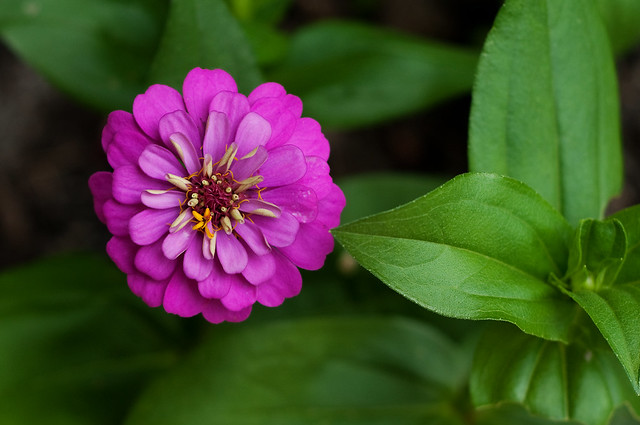
***
by Christie Purifoy | Jul 23, 2014 | children, Gardening, God, motherhood, Scripture, Seasons, Summer, Uncategorized
My youngest, not yet two years old, has begun to say her own name. She has been speaking of other things for quite some time. Important words like “shoe” and “mine” and “chicken.” But apparently one can live perfectly well for many, many months without feeling a pressing need to pronounce your own name.
But if I ask … if I say, “Elsa, where is Elsa?” then she will tap her own chest and say “Elsuh-suh.”

She is my fourth child. This means I am under no illusions. I know that even if I write the memory down in her baby book, even if I manage to capture phonetically the doubled sounds of her pronunciation, I will forget. A day will come, sooner than I imagine, when I will find myself unable to recall the particular cadence of my daughter, naming herself at not-quite-two.
This season, this brief summer at home with my children, seems built entirely of such small things. In five years, I doubt I will be able to recall anything of these weeks.
Scripture speaks repeatedly of a “fountain of life.” I am a mother, and I tend a garden. Raising babies and flowers, I have learned to seek that living, renewing water in things that would seem to be the most fleeting. The most temporary. I have learned that the most important things in life are only rarely weighty enough to settle permanently in our memories.
For instance, just when I had entirely forgotten them, the morning glories have returned. Green leaves and deep purple flowers are twining themselves around the spindles of the front porch. Each fall, the vines die. They die utterly, to the tips of their roots, but before the arrival of the first killing freeze, they scatter their seeds.
In early summer, those seeds sprout and stretch and reach for the same spindles of the same front porch. They are the most ephemeral of flowers. Yet, somehow, they are the most enduring. They are, in their way, eternal.

For years I sought eternity by keeping my arms wrapped tightly around solid things. Permanent things. Things known and understood. Things that were sure to last. These were the things I believed had eternal significance.
But years of mothering and years of gardening have taught me to look elsewhere. These years have taught me that I touch the far horizon of forever when I step forward into emptiness, seeking, like a twirling vine, for things unseen. Unknown. Imperfectly understood.
God our maker has “set eternity in the human heart” (Ecclesiastes 3:11). We reach for the far horizon of forever like those vines reaching for the home, the source, they have never actually touched.
It may be that eternity is the home of so many things I have forgotten or misplaced or failed even to notice.
Certainly, eternity is God’s home. The throne room of the One who counts hairs. Bottles tears. Holds sparrows as they fall.










